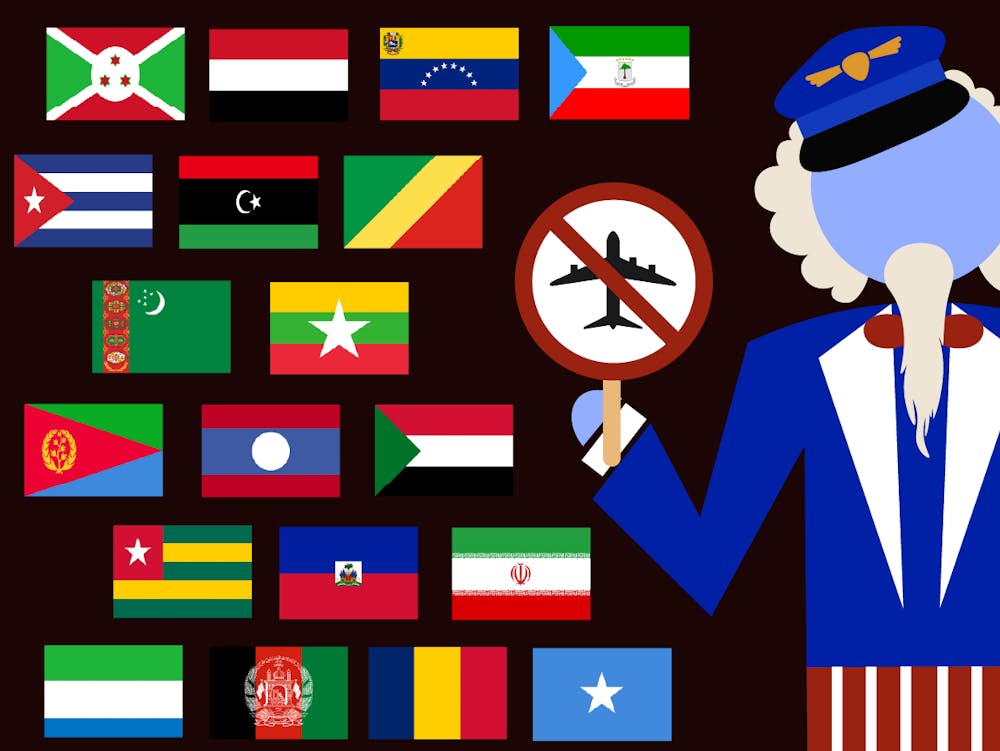In the midst of ICE raids, student visa revocations and international unease, America’s immigrant community is facing another hostile measure.
A travel ban issued on 12 countries by President Donald Trump went into effect June 9, restricting entry into the United States for residents from Afghanistan, Myanmar, Chad, the Republic of the Congo, Equatorial Guinea, Eritrea, Haiti, Iran, Libya, Somalia, Sudan and Yemen.
Trump partially restricted travel to and from Burundi, Cuba, Laos, Sierra Leone, Togo, Turkmenistan and Venezuela.
Visas issued before June 9 will not be revoked, the order said.
The ban impacts UF directly. UF hosts more than 6,000 international students, and students from 140 countries make up more than 25% of UF’s graduate student body.
Iran was one of the top 10 countries for international student enrollment, with 99 students at UF during the Fall 2022 semester. After the ban, some students are left wondering what it means for them and their families.
Hadi Ghasemi, a 35-year-old UF horticultural sciences PhD student, hasn’t been home to Iran for the entirety of his four-year graduate career. It was already difficult to travel to Iran because of the visa process, he said.
The ban adds another level of stress and disconnection from home, he said.
“ We are human,” Ghasemi said. “We have family. We have emotion. We have friends.”
He said most Iranian students can only see their family if they invite them to the U.S. and their parents get approved for visas.
“Right now with this situation, we don't have even that ability to ask [them] to join us here for a short time,” he said.
Ghasemi said he feels bad for the university because the ban will prevent innovative and high-quality students from attending.
While he respects the government's decisions, he thinks Iranians contribute a lot. Allowing them to travel to the U.S. could benefit both countries, he said.
Iranians have already been targeted through Senate Bill 846, which went into effect in December 2023. The bill banned “partnerships,” including recruitment programs, between state universities and any non-U.S. citizen living in a foreign country of concern, like Iran.
It also isn’t the first travel ban on Iranians. During Trump’s first term, he issued a 90-day travel ban on Iran and six other majority-Muslim countries in 2017.
Foreign policies like the bans make it harder for Iranian students to be successful, Ghasemi said. They remove the option of attending a U.S. university, and students have to resort to seeking an education in other countries.
Still, he said he remains hopeful. Politicians come and go, Ghasemi said, and the ban might change by the end of the year.
Trump ultimately helped Iranian students during the last ban with visa exemptions, he said.
“I'm hoping we can have the same thing in the near future,” Ghasemi said.
He has several friends who want to study in the U.S. but currently can’t, he said.
Haiti had 49 international students in the Fall 2022 semester and has a strong community in Gainesville, as represented by UF Club Creole and Gainesville’s Eben Ezer Haitian church.
Guileinah Dupiton, a 21-year-old UF psychology senior, hasn’t visited her family in Haiti since she was in middle school because of internal instability and violence.
Dupiton said she was shocked to hear about the ban but felt numb to the news of frequently changing immigration policies.
“It feels like Haiti is being shut out from the international world,” Dupiton said.
There’s a lot of political unrest in Haiti, Dupiton said, and despite previous involvement by the U.S., the ban seems to leave Haiti to deal with its own turmoil.
“ It's hurtful as someone that's actually really prideful of my heritage to see that happening,” she said.
Many Haitian people who aren’t involved in gang violence seek to leave the island nation, she said, but the ban removes the U.S. as an option.
Dupiton said she’s worried about the ICE raids and whether they will result in the deportation of Haitians who have spent many years establishing a life in the U.S. in places like Gainesville.
“To be sent back after all that time, that's going to be detrimental,” she said.
The U.S. shouldn’t turn its eye away from Haiti, she added, as the nation needs more support.
Omara Obas, a 23-year-old UF occupational therapy graduate student, hasn’t visited family in Haiti since 2018. She said she was shocked to hear about the travel bans and is scared about what might happen in the future.
Family is important, she said, and being separated from them is impactful. She hasn’t seen some of her family in about seven years, and her relationships with them are not as strong as those she has with her family in the U.S.
“In the future, we would've loved to go back and visit our family,” Obas said. “Now, with this happening, it's like there's not even a chance or a possibility that this can happen in the future.”
The ban is like a weight on her shoulders she can’t get rid of, she added.
“It feels like it's out of our hands, and there's really nothing we can do besides accept what's happening,” she said.
Contact Maria Avlonitis at mavlonitis@alligator.org. Follow her on X @MariaAvlonitis.

Maria is the Fall 2025 university editor of the Alligator. She previously worked as the university administration reporter Summer 2025. Maria enjoys walking her dog, and on the rare occassion she has free time, she loves attempting to garden and salsa dancing.






